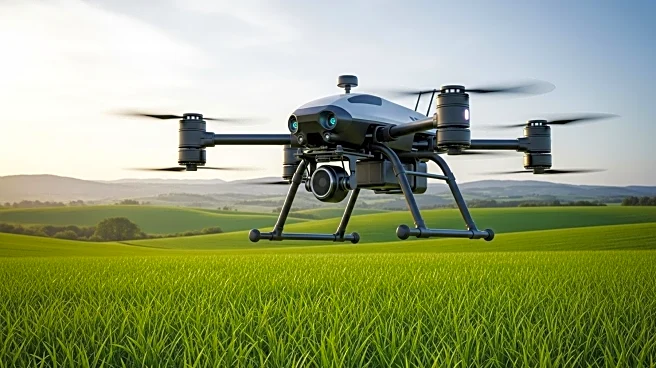What's Happening?
The precision agriculture market in the United States is poised for significant growth, with projections indicating an increase from USD 7 billion in 2022 to USD 18 billion by 2031. This market segment leverages advanced technologies such as IoT devices, GPS, sensors, drones, and data analytics to optimize crop production and resource utilization. The aim is to enhance efficiency, reduce waste, and increase yields through data-driven decisions in areas like soil health, irrigation, fertilization, and pest control. Recent developments include Bonsai Robotics receiving $15 million in funding for autonomous crop harvesting solutions and John Deere deploying fully autonomous tractors for targeted pesticide and fertilizer application.
Why It's Important?
The expansion of precision agriculture is crucial for the U.S. farming industry as it addresses the need for sustainable farming practices amid growing environmental concerns and resource constraints. By adopting smart technologies, farmers can improve crop yields and reduce environmental impact, which is vital for meeting the food demands of a growing population. Key players like Agribotix LLC, Agjunction Inc., and CropMetrics LLC are at the forefront of this transformation, offering innovative solutions that could redefine traditional farming methods. The market's growth also presents opportunities for technological advancements and economic benefits, potentially leading to job creation in tech and agriculture sectors.
What's Next?
As the precision agriculture market continues to evolve, stakeholders can expect further integration of advanced technologies and increased collaboration between tech companies and agricultural producers. The focus will likely be on developing more efficient and cost-effective solutions to enhance farm productivity. Additionally, there may be increased regulatory attention to ensure that these technologies are used sustainably and ethically. The market's growth trajectory suggests that more investments and innovations are on the horizon, which could further accelerate the adoption of precision agriculture practices across the U.S.
Beyond the Headlines
The shift towards precision agriculture also raises questions about data privacy and the ethical use of technology in farming. As farms become more reliant on data-driven solutions, the security of sensitive information and the potential for misuse of technology are concerns that need to be addressed. Furthermore, the transition to high-tech farming may require significant investment and training for farmers, which could be a barrier for smaller operations. The long-term success of precision agriculture will depend on balancing technological advancements with ethical considerations and equitable access for all farmers.










